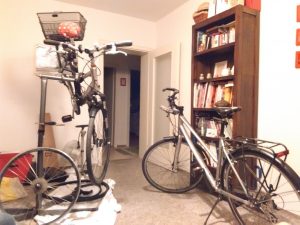The best unemployment insurance is to give yourself a job and have some savings on hand. These two combined can enable you to go 6 months or more without paid work.
The big picture
- The word economy used to mean the household economy.
- A state/national/global economy is necessary for some goods but we shouldn’t put all of our eggs into that one basket.
- South Korea is an example of a country that went from rags to riches in just 20 years because they invested their earnings back into their own industries [1].
- Households can learn from this and reinvest in their home and community economies.
- No one can fire you from the jobs you do for yourself.
How to give yourself a job
- Being a Smart Renter enables you to be your own cook, market gardener, financial planner, extra-low voltage electrician, carpenter, repairer, clothes tailor, bike mechanic, fitness instructor, energy auditor, etc.
- Let’s say that you spend 20% less of your income through insourcing and save it instead; you could save up enough in two and a half years to cover 6 months-worth of income if need be.
- Jobs that may not be practical at a household level can be outsourced to the community, especially if there’s the potential to trade or barter. You can even earn money off your skills.
- Keep a reasonable amount of goods and tools on hand (e.g. common bike parts) that enable you to do your household jobs but don’t spend a fortune.
- A life of satisfying mini challenges is not only more engaging than a computer game, you feel good knowing you made something better and that you can depend on yourself [2].

Never waste a good problem
- A good problem is an opportunity to pick up a skill for free.
- The next time you get a flat tyre on a bike, feel like ordering a pizza or have a broken shelf, resist the urge to pay for a solution and fix the problem yourself.
- There’s heaps of instructional videos, web pages, books at the library, community groups (e.g. Men’s Sheds) and yes, help in minds of family and friends. Tap into these resources and learn.
- If you are proficient at a skill and want to learn a related one, you could offer to solve a problem for a friend or family member and learn in the process.
- Don’t be afraid to learn general skills. Specialisation allows for deep knowledge but is risky if that skill becomes obsolete.
- And let’s not forget, share your skills with others who want to learn to help them to build a more resilient household (we are eternally grateful to those who have done this with us).

Just a small disclaimer here.
- Some jobs are best left to professionals. For example, making your own 12 volt solar system is classed as extra-low voltage so it’s legal to do yourself and the risk is small provided you follow some precautions [3][4].
- Mains power wiring in Australia (240 volts AC) on the other hand is classed as low voltage (because it’s under 1000 volts AC, we know it’s a little confusing) and can only be done by a licensed electrician because there are greater risks involved.
- In other words, whilst there’s always risks in life, be smart about what you should and shouldn’t do.
Taking charge of jobs in your household economy is great unemployment insurance. It gives you valuable skills that can even earn you income and makes you less dependent on paid employment.
Further Reading:
[1] 23 Things They Don’t Tell You About Capitalism by economist Ha-Joon-Chang has a detailed and easy to read explanation about why countries often do and don’t economically succeed.
[2] Read Chapter 17 (p.84) in The Art of Frugal Hedonism by Annie Raser-Rowland and Adam Grubb for a great explanation of this.
[3] If you are looking to build a 12 volt solar system, Solar That Really Works! by Collyn Rivers is an excellent technical guide to building extra-low voltage solar systems for mobile applications whilst setting up your system to be safe and reliable. It’s not a cheap book for its size but the information within it was really valuable for our mobile solar system.
[4] This doesn’t mean you can’t repair some appliances that plug into the wall. If the appliance has a transformer plug (like an internet router), check the output voltage (it’s usually written on the transformer pack) as it is normally well below the Australian legal limits of 120 volts DC and 50 volts AC.
If this is the case, the appliance itself is safe to work on (but not the power supply/transformer as that’s 240 volts AC) provided that it is switched off, unplugged and that you’ve got some basic skills (like how to solder properly). Don’t work on anything that has large capacitors (like cathode ray TVs, power supplies and tube amplifiers) as these can store power and give you a deadly shock even when they are unplugged.